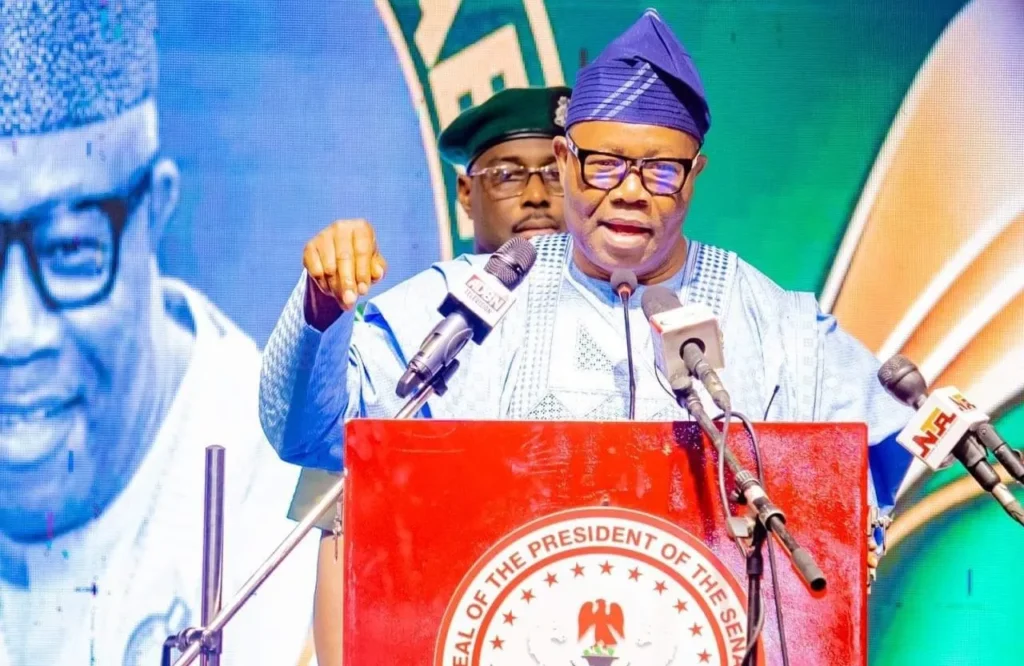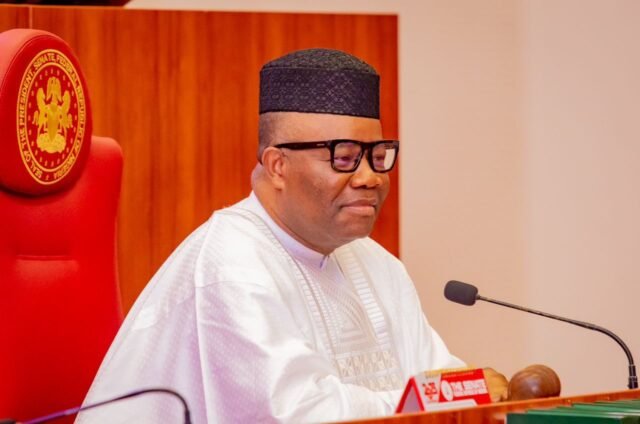In a firm and impassioned address in the Senate chambers, President of the Nigerian Senate, Godswill Akpabio, called for sweeping reforms in how Nigeria invests in its people, but not merely as beneficiaries, but rather as engines of change. He highlighted the escalating exodus of skilled professionals—especially from education, healthcare, and other strategic sectors—as a dire warning sign, one that demands urgent and substantial investment in the nation’s human capital.
Senator Akpabio emphasised that the phenomenon of “brain drain” is not simply an academic concern but an existential threat to national development. “When we lose half of our university lecturers—or tens of thousands of our health workers—it’s not just statistics gone, it’s social progress stalled,” he argued. The Senate President’s remarks underline the gravity of the loss: more than 22,000 Nigerian healthcare professionals are currently employed in the United States alone.
Calls for reform are not new, but Akpabio’s message carried fresh urgency. He urged the Federal Government to substantially increase budgetary allocations in the upcoming 2026 fiscal plan—beginning with the 2025 template—to revitalise universities, retrain healthcare professionals, and invigorate technical and vocational training programs across Nigeria. The Senate, under his leadership, has mandated key committees to collaborate with the Ministries of Finance, Education, Health, and the Tertiary Education Trust Fund (TETFund) to craft a comprehensive strategy.
A National Investment Beyond Building Blocks
Akpabio went on to frame this effort not as charity, but as a strategic investment. He pointed to global benchmarks showing that Nigeria currently ranks among the bottom 20% of nations on the Human Capital Index, limited by underfunded infrastructure, poor health outcomes, and limited quality education. He argued that reversing this trajectory means shifting from reactive, fragmented solutions to a cohesive, nationwide human capital development agenda.
He urged that this funding be tied directly to improving educator salaries—stagnant for over 15 years—and repairing crumbling university infrastructure. This, he stressed, would help retain skilled lecturers and frontline educators. Likewise, he called for sustained investment in rural healthcare centres, retraining and re-hiring frontline health workers, and expanding access to essential services.
Akpabio emphasised that this approach aligns with President Tinubu’s broader human capital vision, which includes raising Nigeria’s global Human Capital Index ranking into the top 80 nations by 2030—a goal only achievable through total national commitment to education, healthcare, and capacity building.

Charting a Human-Focused Economic Revitalisation
Critics may view these calls as politically convenient speeches. But Akpabio was clear: this is a strategic shift essential to national resilience. Without well-trained health workers, reliable teachers, and technical professionals, other macroeconomic plans—such as infrastructure or industrialisation—cannot succeed.
The Senate’s appeal to incorporate explicit human capital investment measures into the 2026 budget includes ring-fenced funds for:
- Competitive salary adjustments for university faculty.
- Infrastructure renovation and upgrades across tertiary institutions.
- National retraining and redeployment schemes for frontline health workers.
- Expanded support for vocational training and technical education.
- Strengthened monitoring via TETFund and Education/Health Ministries.
These proposals reflect a growing consensus. At the May 2024 Bullion Lecture, voices from banking, academia, and public service underscored that Nigeria’s prosperity hinges on sustained investment in its people, not just pipelines and roads. The Senate President echoed this imperative, calling not merely for short-term funding but for systemic reform that anchors Nigeria’s future growth in the richness of its human capital.
Why It Matters
- Stem Brain Drain: By directly addressing remuneration and working conditions, the Senate seeks to halt the mass departure of talented professionals, reclaiming intellectual and human resources.
- Boost National Competence: Enhanced training and infrastructure will elevate the quality of education and healthcare, improving long-term outcomes across sectors.
- Align with Global Indicators: Raising Nigeria’s Human Capital Index ranking is vital for attracting foreign investment and meaningful development cooperation.
- Catalyse Economic Diversification: A healthier, more skilled workforce is crucial for moving beyond oil dependence, into manufacturing, technology, and global competitiveness.
Senator Akpabio closed his address with a rallying cry: “Our greatest assets are not our resources, but our people. It is only through decisive investment in their potential that Nigeria can build a future of innovation, resilience, and shared prosperity.”
As the Senate awaits the detailed 2026 budget proposal, all eyes are now on whether these high-level calls will translate into concrete financial commitments—and whether the Senate’s vision for human capital as the bedrock of national renewal will finally guide Nigeria’s policymaking trajectory.
Join Our Social Media Channels:
WhatsApp: NaijaEyes
Facebook: NaijaEyes
Twitter: NaijaEyes
Instagram: NaijaEyes
TikTok: NaijaEyes
READ THE LATEST EDUCATION NEWS








































